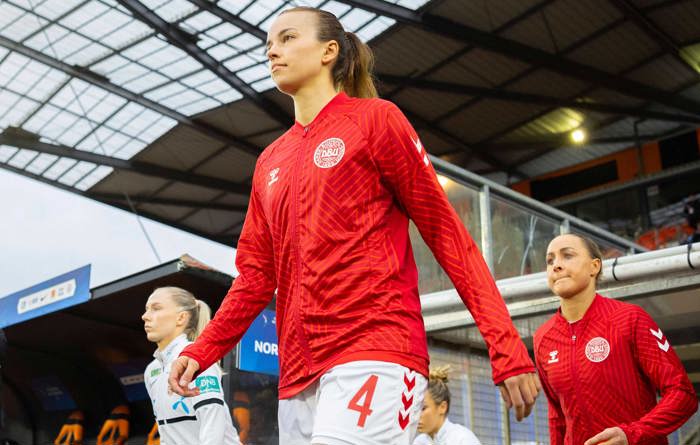Rikke Sevecke, 27, announced her retirement from football in January 2024 due to a heart condition detected in October 2023. The former Brondby, Everton and Portland Thorns defender, who earned over 50 senior appearances for Denmark, highlights the need for better protections among women’s footballers when it comes to monitoring heart health.
By Rikke Sevecke
I never had any previous symptoms that suggested I was living with a heart condition. I had even done medical tests before at my clubs and the Danish national team, some of which were more comprehensive than others.
Before the Women’s World Cup and European Championships, players have to undergo tests for the heart which are regulated by the competition organisers: an electrocardiogram (a recording of the heart’s electrical activity, known as an ‘ECG’) and an echocardiography (an ultrasound examination of the heart, known as an ‘echo’). At Everton, we only did them every two years.
But because I was on the verge of moving to a club in Italy over the summer before the World Cup, I was asked to do an exercise test with ECG monitoring, known as a ‘working ECG’ or ‘stress ECG’ – essentially an electrocardiogram to record the rate and rhythm of the heart when exercising, either on the treadmill or bike. In the past I had mainly done a ‘standard ECG’ or ‘resting ECG’ where I was stationary.
This working ECG showed I had extra heartbeats. And I had a lot of them.
I then had to undergo extra tests, such as a CT scan and MRI scan, but the results came back fine. It showed a normal heart. I even went back to Denmark, did more tests and they said everything looked fine too.
There are many factors as to why the heart can have extra beats, such as carrying a virus, so there were no immediate concerns. I was cleared to play at the World Cup in Australia and New Zealand in July 2023, but it was agreed that I would do the tests again after the tournament.
After the World Cup, in September, I underwent tests again in Copenhagen where I was showing extra heartbeats even more than I was before the tournament. This was alarming.
I had to do further tests on the back of it, and it was confirmed in October that I have ARVC – arrhythmogenic right ventricular cardiomyopathy. In the worst case, it can result in a cardiac arrest. Turns out it’s something I have had my whole life.
The doctor told me I had to quit football straight away. By this stage, I was playing for Portland Thorns and there were only four games left in the NWSL campaign. I asked if I could at least finish the US season, but I was told I had to retire there and then.
It’s scary to think that if I hadn’t decided to go to another club in the summer, and thus hadn’t done a stress ECG, my heart condition wouldn’t have been diagnosed – and it could have been detected when something much worse had happened.
I had only ever done one stress ECG prior – in 2019 – but there were no concerns at the time. It was only at 27, after many previous standard ECGs and echocardiograms, that my condition was picked up, which shows the medical gaps that currently exist in football. I’m not an expert. I’m not a doctor. I just know what happened in my situation. And I know if I hadn’t done that test, I wouldn’t have known about having ARVC.
I want to use my story to bring awareness to this and push for change. We shouldn’t be taking chances on players’ health and safety at work. That is why stress ECGs should be introduced more widely in football. I was fortunate that I was able to have one, which potentially saved my life, yet this privilege is not afforded to all players right now.
“If I hadn’t decided to go to another club in the summer, and thus hadn’t done a stress ECG, my heart condition wouldn’t have been diagnosed – and it could have been detected when something much worse had happened.”
— by Rikke Sevecke

I received a lot of support from the player unions in England and Denmark. Spillerforeningen always makes sure that players are insured the right way and that they’re covered if something happens, while the English PFA’s education programmes have been helping me prepare for life after football.
Right now, I’m doing Visa’s The Second Half programme and I’m using that to figure out what I want to do as my next career move, while at the same time learning from organisations and former athletes.
I’m also involved in Female Invest, which helps women with advice and recommendations on making investments. I’m now an ambassador for the Danish Heart Foundation, where I will soon be telling my story, refreshing my CPR course, taking part in hospital visits and engaging with patients who have heart conditions.
I do miss football. I miss the bonding. I miss being part of a team. I miss reaching a goal together. I miss winning on the pitch. As an athlete, that winning mentality doesn’t leave you; I still want to be the best. That’s why, whatever comes next, I’m still going to be giving it one hundred percent.